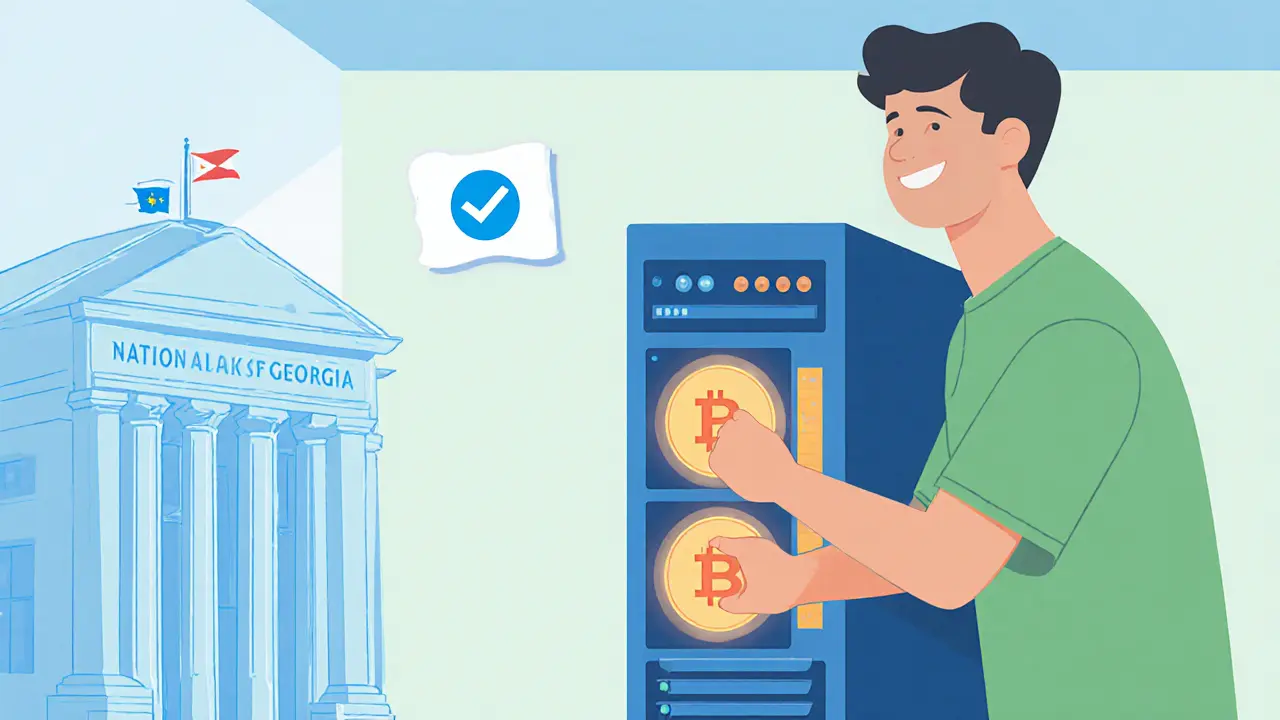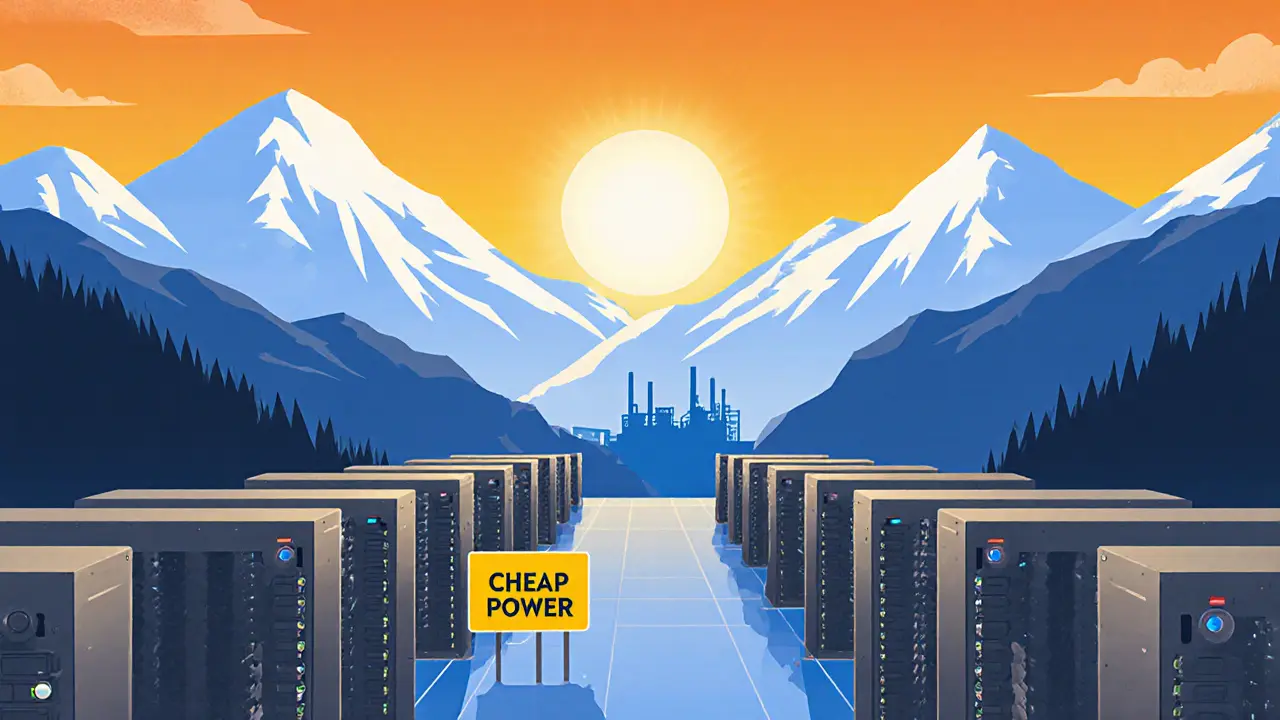Georgia Crypto Mining Regulations & Licensing Guide 2025
 Dec, 14 2024
Dec, 14 2024
Georgia Crypto Mining Cost Calculator
When you hear that Georgia is a hotspot for crypto mining, the first question is usually: "What’s the legal catch?" The short answer is there isn’t one-if you know the rules. Georgia crypto mining thrives under a clear, forward‑looking framework that lets both hobbyists and big operators set up shop without fear of sudden bans.
Cryptocurrency mining in Georgia is a legal activity regulated by the National Bank of Georgia (NBG) and the Financial Monitoring Service (FMS), with licensing options that suit solo miners and large enterprises alike. Understanding the licensing landscape, tax treatment, and compliance duties is essential before you plug in your rigs.
Quick Takeaways
- Mining is 100 % legal in Georgia; individuals pay zero crypto tax.
- Commercial miners need a standard business registration and may need a VASP or Free‑Zone licence.
- Two main licences: mainland VASP (full‑service) or Tbilisi Free Zone (off‑shore, tax‑free).
- AML/CFT compliance is mandatory; the FMS monitors suspicious activity.
- Energy costs are low, especially in mountainous regions or industrial zones.
Legal Status - Is Mining Really Allowed?
Since 2023 the NBG has treated crypto as personal property, not legal tender. That means you can mine, hold, and sell digital assets without needing a special permit just for the act of mining. The only caveat is that if you start offering wallet services, exchanges, or any kind of asset custody, the Virtual Asset Service Provider (VASP) registration law kicks in.
Licensing Paths: VASP vs. Tbilisi Free Zone
While you don’t need a licence to turn on a GPU, you do need the right corporate paperwork to run a legitimate mining business. Georgia offers two routes:
| Feature | VASP (mainland) | Tbilisi Free Zone (FIZ) |
|---|---|---|
| Scope | All crypto‑related services within Georgia | Off‑shore crypto activities, tax‑free |
| Initial cost (USD) | ~$5,000‑$7,000 | ~$3,000‑$4,500 |
| Annual renewal | $1,200 | $800 |
| Taxation | Corporate tax applies (15 % on profits) | 0 % corporate tax in FIZ |
| Regulatory body | National Bank of Georgia | Tbilisi Free Zone Authority |
| Compliance focus | Full AML/CFT reporting | AML/CFT reporting, but lighter audit load |
Most small‑scale miners stick with a simple company registration and skip the VASP licence unless they plan to offer additional services. Larger farms, especially those attracting foreign capital, often choose the FIZ route for its tax‑free status.
Tax Treatment - What Do I Pay?
Georgia’s tax code treats crypto earnings as property gains. For individuals, the government has a generous zero‑tax policy: any crypto you mine and later sell is tax‑free. That’s a huge advantage over Europe or the U.S., where capital gains tax can eat into profits.
Companies, however, are subject to the standard 15 % corporate tax on net profits unless they qualify for the FIZ exemption. The key is proper bookkeeping-track electricity costs, hardware depreciation, and any other deductible expenses. The NBG’s guidance notes that you can offset up to 30 % of energy expenses against profit, which further lowers the effective tax rate.
Energy, Location, and Infrastructure
Georgia’s natural cooling and cheap electricity are the real magnets for miners. Roughly 2 % of the nation’s total electricity consumption goes to crypto mining-still a modest slice compared with countries like Kazakhstan where mining can surpass 10 %.
Where you set up matters:
- Mountain regions (e.g., Svaneti, Racha): Free or ultra‑low electricity, cooler ambient temperatures, but limited fiber connectivity.
- Industrial zones in Tbilisi or Kutaisi: Higher reliability, better internet, access to skilled workers, but electricity rates are closer to the national average.
Most enterprises start in a mountain locale to keep costs low, then gradually move to an industrial hub as they scale and need more stable power and logistics.
Compliance - AML, CFT, and Reporting
Even if you’re just mining, the Financial Monitoring Service (FMS) expects you to follow AML/CFT rules. That means:
- Maintain a Know‑Your‑Customer (KYC) register for any employees who handle wallet addresses.
- Report any transaction over €10,000 (or equivalent in GEL) to the FMS.
- Conduct an annual AML audit by a certified firm.
The IMF’s 2024 recommendation pushed the NBG to tighten these rules, with full enforcement slated for 2026. Staying ahead of the compliance curve protects you from fines and possible licence withdrawal.

Step‑by‑Step: Getting Your Mining Business Legal in Georgia
- Choose a legal structure. Most miners register as a Limited Liability Company (LLC). The incorporation fee is about $500.
- Apply for the appropriate licence. If you only mine, you can skip the VASP licence. If you plan to run a pool or exchange, file for a VASP or FIZ licence.
- Open a corporate bank account. The NBG requires at least one local director; a local bank will ask for the licence copy and AML policies.
- Set up AML/CFT procedures. Draft a KYC policy, appoint a compliance officer, and schedule the annual audit.
- Secure a power contract. Negotiate with the national grid or local utility; many mountain communities offer subsidised rates for crypto farms.
- Install hardware and monitoring tools. Use remote management software to track hash‑rate, temperature, and energy consumption.
- File the first tax return. Even if you owe zero tax, reporting is mandatory for corporate entities.
Following these steps keeps your operation on the right side of the law and helps you avoid unexpected shutdowns.
Common Pitfalls and How to Avoid Them
- Ignoring the FMS. A missed report can result in a 5 % fine of monthly revenue.
- Assuming zero tax for companies. Only individuals get the tax‑free benefit; corporations must file.
- Overlooking hardware import duties. While no special crypto tax exists, standard customs duties (about 12 %) still apply.
- Choosing the wrong location. Cheap power is great, but without reliable internet you’ll lose hash‑rate to downtime.
Future Outlook - What’s Next for Georgian Mining?
Analysts expect Georgia’s share of global mining to creep up from 5 % to around 7 % by 2028. The government is investing in renewable energy projects-hydropower in the Caucasus-that could further lower electricity prices for miners. At the same time, the NBG is drafting a “Digital Asset Integration Act” that may introduce a modest levy on large‑scale mining farms to fund national blockchain research. Stay tuned; the regulatory environment is designed to evolve without shocking existing operators.
Do I need a licence just to mine Bitcoin in Georgia?
No. Mining by itself is legal and licence‑free for individuals. Only if you provide additional services like a pool, wallet, or exchange do you need a VASP or Free‑Zone licence.
Are mining profits taxed for residents?
Residents who mine personally pay zero tax on crypto earnings. Companies are subject to the standard 15 % corporate tax unless they qualify for the tax‑free Free‑Zone regime.
What is the difference between VASP and Free‑Zone licences?
VASP covers all crypto activities on the mainland and is taxed at the normal corporate rate. The Free‑Zone licence is an off‑shore structure offering 0 % corporate tax and lighter reporting, but it limits you to operations based in the Tbilisi Free Zone.
How do I stay compliant with AML/CFT rules?
Implement KYC for any wallet handling, report large transactions to the FMS, and schedule an annual AML audit by a certified firm. Keep all records for at least five years.
Which region in Georgia offers the cheapest electricity?
Mountainous areas like Svaneti and Racha often provide free or heavily subsidised power, especially for renewable‑energy projects. Industrial zones have higher, but more stable, rates.
Ron Murphy
October 25, 2025 AT 10:43Georgia’s crypto mining setup is actually one of the few places where the rules don’t feel like a trap. Zero tax on personal mining? That’s wild. Most countries tax you just for owning Bitcoin, let alone mining it.
Still, the VASP vs Free Zone distinction trips people up. If you’re just running a few ASICs in your garage, you’re fine. But if you’re thinking about running a pool or hosting wallets, you better get that paperwork sorted. The FMS isn’t messing around anymore.
Prateek Kumar Mondal
October 26, 2025 AT 04:31Georgia is quietly becoming the new Dubai for miners. Low power, no tax, clear rules. Why are people still mining in Kazakhstan or Russia when this exists
Nick Cooney
October 26, 2025 AT 18:11soooo… you’re telling me if i mine 100 btc and sell it i pay $0 in taxes but if i open a coffee shop next to my rig i pay 15%? that’s not a tax policy that’s a joke. also i typed this on my phone so forgive the typos but this is real life people
Clarice Coelho Marlière Arruda
October 27, 2025 AT 01:28wait so if i mine as an individual i dont need to report anything at all? not even like… a form? i feel like this is too good to be true. did they just forget to make a form for it
Brian Collett
October 27, 2025 AT 14:17the mountain regions thing is genius. i’ve seen videos of guys mining in abandoned Soviet-era power stations up in Svaneti. the electricity is basically free and the cold keeps the rigs from overheating. the only downside is if your internet goes out for a day you lose a week of hash rate. but still, wild setup.
Allison Andrews
October 28, 2025 AT 04:44it’s fascinating how Georgia treats crypto as property rather than currency. it’s a philosophical shift from most jurisdictions that still treat it like money. this way, mining isn’t income-it’s just acquiring an asset. no wonder it’s so attractive. it’s not about regulation, it’s about ontology. what is crypto, really? and Georgia says: it’s property. simple, elegant.
Wayne Overton
October 29, 2025 AT 03:48they dont even check if you have a license. i mined for 6 months and no one came. just keep it quiet and youll be fine
Alisa Rosner
October 29, 2025 AT 23:34HEY FRIENDS 😊 just wanted to say-if you’re thinking about mining in Georgia, DO IT! 🌟 the tax-free zone is a dream come true! 💰 just make sure you get your AML audit done every year (it’s only $300!) and you’ll be golden! 🏔️⚡ also, use a local lawyer-they’re super helpful and speak English! 📞❤️
MICHELLE SANTOYO
October 30, 2025 AT 09:53you think this is freedom? it’s just capitalism with better branding. they let you mine so they can sell you power, internet, and compliance services. it’s a trap wrapped in a mountain view. the real winners are the lawyers and the power companies. you’re just the sucker with the ASICs
Lena Novikova
October 31, 2025 AT 02:35everyone’s acting like this is some genius policy but its just because georgia has no other economy. they’re desperate. you think they care about you mining? they care about the money you bring in. if you get caught not reporting a 12k transaction they’ll freeze your account faster than you can say ‘blockchain’
Olav Hans-Ols
October 31, 2025 AT 13:26love how Georgia’s approach is basically ‘do your thing, just don’t be sketchy.’ it’s refreshing. i’ve seen so many countries panic and ban crypto, then realize they lost jobs and investment. georgia said ‘let’s build it right.’ the energy thing is the real MVP-hydro power from the caucasus mountains? genius. if you’re thinking about setting up, go for it. just don’t skip the audit. it’s worth the hassle.